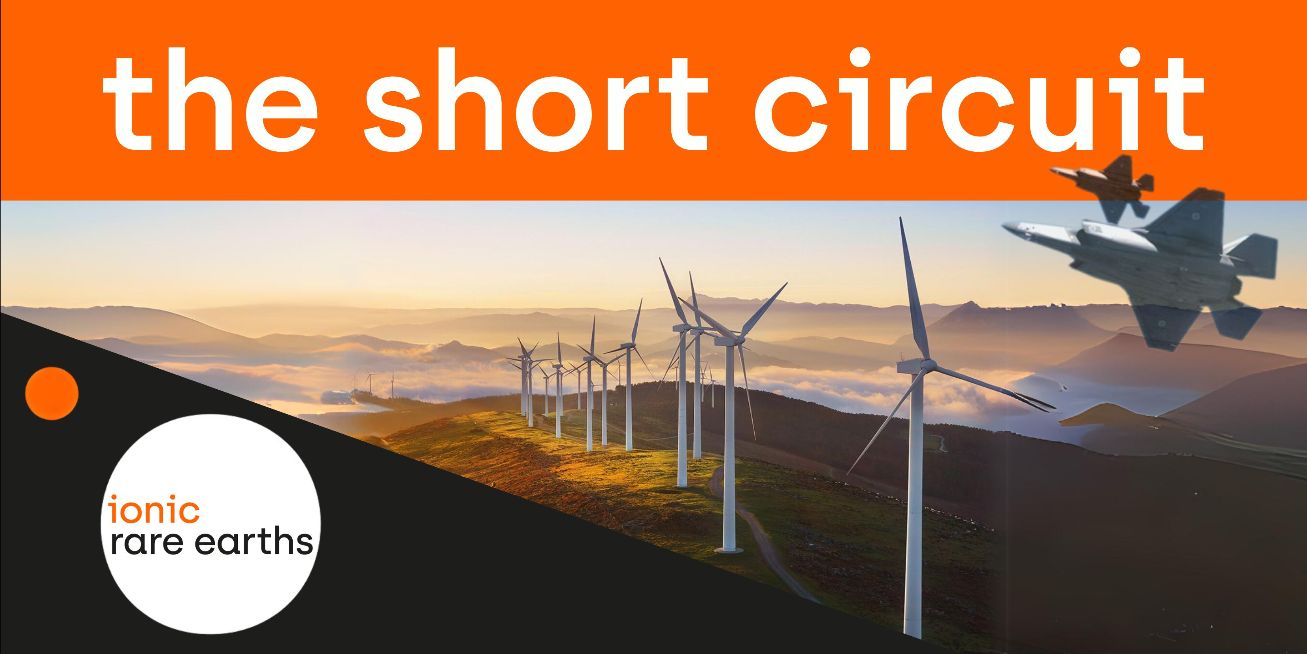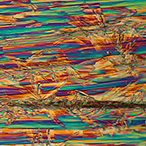Breaking China Dominance: IonicRE Delivers Magnetic Rare Earth Ore to Brazil

IonicRE delivers first recycled rare earth oxides to Brazil, demonstrating viable alternative to Chinese supply chains with 43.6% IRR recycling economics.
- Ionic Rare Earths (ASX: IXR) delivered the first recycled magnet rare earth oxides to Brazilian manufacturer CIT SENAI through its Viridion joint venture, marking a significant milestone in establishing domestic rare earth supply chains outside China
- The delivery includes high-purity neodymium, praseodymium, dysprosium, and terbium oxides sourced from Brazilian end-of-life magnets and processed using IonicRE's patented recycling technology at their Belfast facility
- IonicRE's November 2024 feasibility study demonstrates strong economics for magnet recycling with a post-tax NPV of US$502 million, 43.6% IRR, and 2.4-year payback period for their Belfast operation
- The company operates across the entire rare earth value chain through three key assets: the Makuutu project in Uganda (60% ownership moving to 94%), magnet recycling facilities (100% ownership), and the Brazilian Viridion joint venture (50% ownership with Viridis Mining)
- Policy support from the EU's Critical Raw Materials Act requiring 25% recycled content by 2030, combined with China's export restrictions, creates favorable market conditions for alternative rare earth suppliers like IonicRE
The Strategic Case for Investing in Rare Earth Magnet Recycling
The global rare earth elements market is experiencing a fundamental shift as governments worldwide recognise the critical importance of securing domestic supply chains for materials essential to the energy transition. Ionic Rare Earths Limited (ASX: IXR) has positioned itself at the forefront of this transformation through its pioneering magnet recycling technology and integrated approach to rare earth production.
Historic Breakthrough in Brazilian Supply Chain Development
IonicRE's recent delivery of recycled magnet rare earth oxides to Brazil represents more than a commercial milestone—it demonstrates the viability of establishing sovereign rare earth capabilities outside China's dominance. The shipment, delivered through the company's Viridion joint venture with Viridis Mining and Minerals, contained high-purity neodymium, praseodymium, dysprosium, and terbium oxides processed from Brazilian end-of-life magnets.
MD, Tim Harrison emphasised the significance of this achievement: "We welcome this development which represents a major milestone for both IonicRE and our Viridion JV, as we progress our global roll out, establishing domestic capability in Brazil and leveraging our technology to accelerate new rare earth supply chains based on recycling."
This delivery comes amid China's recent rare earth export controls, which have heightened the urgency for diversified supply chains. Brazil, as the world's seventh-largest wind energy market with 29% compound annual growth over the past decade, represents a substantial opportunity for rare earth demand growth driven by renewable energy expansion and electric vehicle production.
Compelling Economics of Magnet Recycling
IonicRE's November 2024 feasibility study for its Belfast magnet recycling facility reveals attractive investment metrics that distinguish it from traditional mining operations. The study, based on processing 1,200 tonnes per annum of end-of-life NdFeB magnets to produce 400 tonnes of separated rare earth oxides, projects a post-tax net present value of US$502 million with an internal rate of return of 43.6%.
The facility requires initial capital expenditure of US$108.7 million with operating costs of US$27.68 per kilogram of rare earth oxide, excluding magnet feedstock. The 2.4-year payback period reflects the superior economics of recycling compared to traditional mining, which typically requires significantly higher capital investment and longer development timelines.
The recycling approach offers several advantages over conventional mining operations. First, it provides supply chain independence from mining permits and associated regulatory risks. Second, the technology addresses growing environmental concerns by creating a circular economy for rare earth materials. Third, operating costs can be further reduced in other jurisdictions, with preliminary estimates suggesting potential savings in the United States and Brazil compared to Belfast operations.

Integrated Value Chain Strategy
IonicRE's comprehensive approach spans the entire rare earth value chain through three strategic pillars. The Makuutu Rare Earths Project in Uganda, where IonicRE holds 60% ownership increasing to 94%, received its mining license in January 2024 and has begun producing mixed rare earth carbonate through its demonstration plant. The project's March 2023 feasibility study indicated low capital requirements and modular development potential.
The company's magnet recycling operations, wholly owned through subsidiary Ionic Technologies, represent the most advanced component of the business. The Belfast demonstration plant operates continuously, producing separated magnet rare earth oxides with purity exceeding 99.9%. This first-mover advantage in industrial-scale magnet recycling positions IonicRE to capitalise on growing demand for recycled materials.
The Brazilian joint venture with Viridis Mining adds geographic diversification and access to lower-cost operations. Executive Chairman Brett Lynch highlighted the strategic importance: "Brazil is a key part of our global expansion strategy, with the potential to replicate Ionic Technologies' magnet recycling technology in markets including the UK, Europe, Asia and both North and South America."
Policy Tailwinds Supporting Market Growth
Regulatory developments across major economies create favourable conditions for recycling-focused rare earth companies. The European Union's Critical Raw Materials Act, implemented in 2024, mandates that 25% of annual rare earth consumption must come from recycling by 2030, up from the originally proposed 15%. This regulatory requirement ensures demand visibility for recycling operations.
The United States has similarly prioritised supply chain security through executive orders and funding programs, while the United Kingdom has refreshed its Critical Minerals Strategy to emphasise circular supply chains. These policy initiatives reflect growing recognition that recycling offers faster deployment and lower risk compared to developing new mining operations.
Technology Differentiation and Scalability
IonicRE's proprietary hydro-metallurgical recycling technology, developed through its Ionic Technologies subsidiary, provides competitive advantages in processing efficiency and product quality. The technology achieves near-complete extraction of rare earth oxides from lower-quality spent magnets, producing separated products with purity exceeding 99.9%.
The company has demonstrated successful scaling from laboratory to demonstration plant operations, with plans for commercial-scale deployment. Partnership agreements with major automotive and manufacturing companies, including Ford Technologies and Less Common Metals, validate the technology's commercial viability and provide potential off-take channels.
Financial Position and Funding Strategy
IonicRE has submitted a grant application for substantial capital investment from the UK Government's Automotive Transformation Fund, which deploys up to £850 million to support electric vehicle supply chain development. This potential cornerstone funding would significantly de-risk the Belfast project development.
The company's multi-asset approach provides financing flexibility, with potential for project-level debt, strategic partnerships, and off-take agreements. The demonstration plant's operational status allows for immediate revenue generation while larger facilities are developed.
The Investment Thesis for Ionic Rare Earths
Strategic Positioning
Ionic Rare Earths has established a commanding first-mover advantage in commercial-scale magnet recycling, with an operational demonstration plant already producing rare earth oxides with purity exceeding 99.9%. This technological leadership is reinforced by the company's integrated value chain approach, spanning mining operations in Uganda, recycling facilities in the UK, and refining capabilities in Brazil through joint ventures. The diversified geographic footprint provides multiple revenue streams while reducing single-jurisdiction risks. Validation of the company's commercial viability comes through strategic technology partnerships with major automotive manufacturers, including Ford Technologies, which demonstrates industry confidence in IonicRE's recycling capabilities and provides potential offtake channels for future production.
Market Opportunity
The investment case for IonicRE is underpinned by powerful regulatory drivers creating guaranteed demand for recycling operations. The European Union's mandate requiring 25% recycled rare earth content by 2030 establishes a regulatory floor for recycling demand, while China's recent export restrictions and escalating geopolitical tensions have intensified the urgency for alternative supply sources. This policy-driven demand coincides with explosive growth in electric vehicle production and renewable energy deployment globally, both of which require substantial rare earth inputs for permanent magnets. The combination of regulatory mandates and organic demand growth creates a compelling dual catalyst for sustained market expansion.
Financial Metrics
The economic attractiveness of IonicRE's recycling operations is demonstrated through robust feasibility study results for the Belfast facility, showing a post-tax internal rate of return of 43.6% and net present value of US$502 million with a remarkably short 2.4-year payback period. These metrics compare favourably to traditional mining operations, which typically require significantly higher capital investment and longer development timelines. The company has identified substantial cost optimisation opportunities across different jurisdictions, with preliminary analysis suggesting potential operating cost reductions of up to 35% in Brazil compared to Belfast operations. This geographic arbitrage opportunity enhances the scalability and profitability of the business model.
Risk Mitigation
IonicRE's diversified asset portfolio across three distinct projects and geographies provides natural risk mitigation compared to single-asset mining companies. The recycling operations offer particular advantages in risk management, as they remain independent of mining permits, environmental approvals, and the lengthy development timelines associated with traditional rare earth projects. Strong government policy support through grant applications, including the potential UK Automotive Transformation Fund investment, provides additional downside protection and validates the strategic importance of the company's technology. The operational demonstration plant reduces technology risk by proving commercial viability at scale.
Actionable Investment Considerations
Investors should closely monitor several key catalysts that could drive near-term value realization. The progress of IonicRE's UK Automotive Transformation Fund grant application represents a potential cornerstone funding event that would significantly de-risk the Belfast facility development. The Brazilian joint venture development timeline and potential expansion opportunities provide additional growth optionality, while partnership announcements with automotive and manufacturing companies could secure long-term off-take agreements. The Makuutu project development in Uganda offers a complementary growth driver, and investors should assess the integration timeline and impact on overall cash flow generation as the company transitions from demonstration to commercial operations.
Ionic Rare Earths represents a compelling investment opportunity in the critical minerals sector through its pioneering approach to rare earth recycling and integrated value chain strategy. The company's recent delivery of recycled rare earth oxides to Brazil demonstrates the commercial viability of establishing alternative supply chains outside China's dominance. With strong feasibility study economics, supportive policy frameworks, and first-mover advantages in magnet recycling technology, IonicRE is well-positioned to capitalise on the growing demand for sustainably sourced rare earth materials essential to the global energy transition.
The Rare Earth Supply Chain Revolution
The global rare earth elements market is undergoing a fundamental restructuring driven by geopolitical tensions, environmental concerns, and policy mandates for supply chain diversification. China's dominance in rare earth production and recent export restrictions have created urgent demand for alternative sources, particularly in Western markets prioritising energy transition technologies.
The circular economy approach to rare earth supply offers compelling advantages over traditional mining. Recycling operations require significantly lower capital investment, shorter development timelines, and reduced environmental impact while providing comparable product quality. The growing volume of end-of-life magnets from decommissioned wind turbines and electric vehicles creates an expanding feedstock base for recycling operations.
Policy support across major economies reinforces the strategic importance of recycling. The EU's Critical Raw Materials Act requirement for 25% recycled content by 2030 represents a paradigm shift toward circular supply chains. Similar initiatives in the United States and United Kingdom demonstrate coordinated Western efforts to reduce dependence on Chinese rare earth supplies.
Chairman, Brett Lynch said, "With China's moves to restrict rare earth exports the rest of the world has a necessity to develop its own supply chains. IonicRE offers one of the fastest pathways to developing this supply, in a secure and sustainable manner with the lowest carbon emissions and low capex development model compared to mining."
The convergence of supply security concerns, environmental sustainability requirements, and favourable economics positions rare earth recycling as a critical component of future supply chains, creating substantial opportunities for companies with proven technology and operational capabilities.
Analyst's Notes




Subscribe to Our Channel
Stay Informed


















